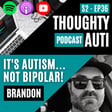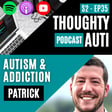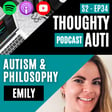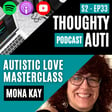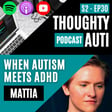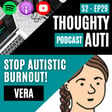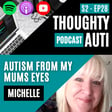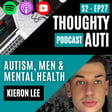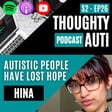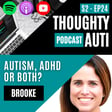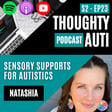
The Life Of Autistic Miss Florida with Rachel Barcellona
Who is Rachel Barcellona? Why did her Christian school try to 'cure her Autism'? How did Rachel Barcellona become Miss Florida?
TW: Bullying and one mention of inappropriate touching of a minor
Rachel Barcellona (@rachelbarcellonaxo), also known as Miss Florida, is a US-based model, singer, stand-up comedian, theatre star, and autism advocate. Her company 'Ability Beyond Disability inc' serves to cement her dream of providing adequate inclusion for all people.
Working closely with the EPIC Players, New York's leading neuro-diverse theatre company, she champions Autism on mainstream media platforms like CNN, NBC, and Forbes. Rachel is also involved with a multitude of different charities, serving as a board member for C.A.R.D. USF, Unicorn Children's Foundation, Els for Autism Center of Excellence, and the Dyspraxia Foundation USA.
Rachel's Insta - https://www.instagram.com/rachelbarcellonaxo/ // My Links - https://linktr.ee/thomashenleyUK
Dbud Noise Cancelling Adjustable Ear Buds (15% Off) - https://dbud.io/thomashenley
Thomas Henley (host) and Rachel Barcellona (guest) start by conversing about the prevalence of Spelling Bees in the USA compared to the UK, but they soon dive into Rachel's backstory with Autism. Professionals diagnosed Rachel Barcellona with Autism at the young age of 3, where she experienced a speech delay until 5; her parents were told that she would never go to college or achieve anything notable in life.
They discuss the issue of manipulation and abuse particularly for autistic women. At her middle school age, Rachel Barcellona spent her time at a Christian school which allegedly manipulated her family into thinking it was the most inclusive place she could be. Unbeknownst to them, the school had an ulterior motive to 'cure' or 'remove' Autism in their students. Rachel was sadly a victim to the principal at the school, where they inappropriately touched her and proceeded to label her as the Devil's Child or Satan's Daughter.
Rachel Barcellona spent many of her school days isolated and bullied due to her differences but decided to post positive notes on her bully's lockers to have a positive impact... which eventually turned into the work she carries out in the modern day. Doesn't sound like the work of the devil to me! Rachel highlights her core value of putting herself and her family first, and how her large extended family supported her throughout the difficult times of her life.
Pivoting to Rachel's pageant, theatre, and singing success, they talk about her work with the neurodiverse theatre company Epic Players and how her failures in middle school had a positive impact on her ability to handle rejection... something commonplace for a budding Broadway prodigy! With her fingers in many pies, she explains her journey through performing arts, from cheerleading to singing, to theatrical performances. Pointing to her autistic gift of perfect pitch, Rachel talks about her love of Opera and how that inspired her to sing the USA National Anthem in Madison Square Gardens.







